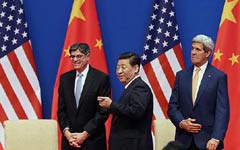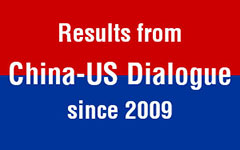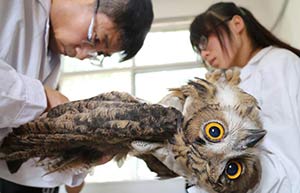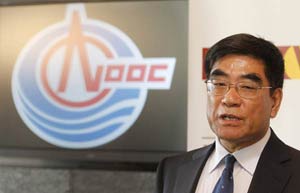Dispelling distrust across the Pacific
By Shen Dingli (China Daily) Updated: 2014-07-10 07:26As the US is an ally of both Japan and the Philippines and has made itself an interested party in the disputes, Beijing and Washington should use this round of the S& ED to discuss risk avoidance and ways to take some of the steam out of the current tensions.
The complex security relationship between China and the US has taken another hit since the last round of the S&ED. Despite the US' cyber espionage against China, which has been clearly revealed by the former CIA contractor Edward Snowden, China has been willing to partner with the US through a joint Working Group on Cybersecurity, which was launched after the last dialogue. However, while the US has still failed to give China any explanation for its spying, it has also indicted five Chinese People's Liberation Army officers for allegedly conducting cyberattack against the US. This move has obstructed the continuation of the joint working group.
|
 |
|
 |
"Our interests are more than ever interconnected," Xi said on Wednesday in his speech at the opening ceremony for this year's dialogue, saying the two nations "stand to gain from cooperation and lose from confrontation".
"If we are in confrontation it will surely spell disaster for both countries and for the world," he said, adding the Pacific powers need to "break the old pattern of inevitable confrontation".
In a statement issued by the White House on Wednesday, President Obama said the US is committed to building a "new model" of relations with China that is defined by cooperation and the constructive management of differences. "We remain determined to ensure that cooperation defines the overall relationship," Obama said.
Actually, Beijing and Washington are already successfully working together on many issues, such as maintaining the stability of the Korean Peninsula, collaborating in international efforts to dismantle Syria's chemical weapons arsenal, and through a decade of difficult engagement with Iran. China's persistent stance of settling the Iranian nuclear issue peacefully has gained steam with the "6+1" negotiations.
As Beijing and Washington nurture their new model of a major-country relationship through its infancy, it is unrealistic to expect it to always be plain sailing. It is due to the challenges they face when it isn't going smoothly that the strategic dialogue is so important.
The author is professor and associate dean of the Institute of International Studies, Fudan University.
- Top international luxury brand expo opens in Beijing
- Woman sells Beijing house, buys six properties in US
- Green finance needs government intervention: experts
- China signs $1.6b engineering deal for Siberian LNG project
- Fonterra joins Abbott to plan third dairy hub in China
- Lufthansa sees full Air China joint venture not before 2016
- Bigger govt role needed in green finance
- BIT to re-anchor US-China economic relationship

















